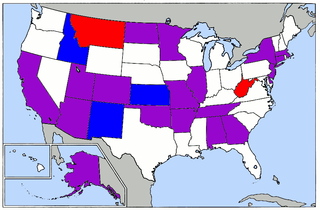Clinton and Obama in tight race, McCain surges in Super Tuesday voting
Wednesday, February 6, 2008
Voters went to the polls and to caucuses in 24 states Tuesday, providing both Democratic presidential candidates, New York Senator Hillary Clinton and Illinois Senator Barack Obama, with significant wins. On the Republican side, Arizona Senator John McCain surged ahead of his main rival, former Massachusetts Governor Mitt Romney.
Super Tuesday's early results showed big wins for Hillary Clinton in some very delegate-rich states, including the state she represents, New York, and Arkansas, where she lived when her husband, former President Bill Clinton, was governor. But she also won the state of Massachusetts, in spite of the fact that Massachusetts Senator Edward Kennedy had endorsed Obama. Clinton also scored victories in New Jersey, Tennessee and Oklahoma.

Barack Obama won his home state of Illinois as well as Georgia, Alabama, Delaware, Connecticut, Minnesota, North Dakota and Kansas. Although Clinton won in the states with the largest delegate counts, Obama will still garner a large number of those delegates because the Democrats award them by proportion of the vote for each candidate.
The biggest Super Tuesday prize, California had Clinton winning on the Democrat side and McCain winning the Republicans.
On the Republican side, it was a good day for John McCain, who won seven states in the early hours of vote counting. Mitt Romney, so far, has won his home state of Massachusetts, Minnesota, North Dakota and Utah. Former Arkansas Governor Mike Huckabee won his home state as well as West Virginia, Georgia and Alabama. Both Huckabee and Romney say they will stay in the race, but analysts say the big wins by McCain have given him the momentum and the delegate lead that could help him clinch his party's nomination fairly soon.
In both parties, Super Tuesday was a watershed in that it ended the phase of the campaign when candidates could win a state or two in hopes of building the perception of momentum. From now on it will be a flat-out contest for delegates.
The next contests will be this coming Saturday when Louisiana holds its Presidential primary, Kansas Republicans hold caucuses and Democrats hold caucuses in both Nebraska and the state of Washington. The process of selecting candidates for each party will culminate in the national conventions. The Democrats will meet in Denver at the end of August and the Republicans will meet during the first week of September in Minneapolis.
Sister links
- United States presidential election, 2008 on Wikipedia.
- Super Tuesday (2008) on Wikipedia.
Sources
- Bill Schneider. "Clinton, McCain take California, CNN projects" — CNN, February 6, 2008
